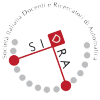Scuola di dottorato SIDRA 2018
| Coordinator: | Andrea Serrani (The Ohio State University, Columbus, OH - USA) |
School Objectives
To give a fairly broad (albeit necessarily incomplete) treatment of classic and more recent methodologies for adaptive control of linear systems and fundamental issues in adaptive control design. The goal of the course is not that of giving a detailed description of several methodologies, rather to introducing a few selected techniques that serve the purpose of highlighting fundamental concepts in the analysis and design of adaptive control systems. Emphasis will be placed on understanding key issues in stability and robustness of adaptive control loops.
Teaching aids and instructional materials
According to the spirit of the latest editions, the teaching style of the lectures will be a traditional one, making use as much as possible of the blackboard for derivations, complemented as appropriate by videos, simulations, and diagrams. The speakers will provide a collection of handouts as material supporting the lectures. This material will be available at least one week before the start of the School.
Course Language
The PhD School will be taught in English.
Course Prerequisites
A beginning graduate-level course in linear systems theory is required. Exposure to nonlinear control theory is desirable but not essential. Familiarity with the basic concepts of Lyapunov stability theory is highly desirable.
Examination and grading
Examination and grading: Grading will be based on a take-home nal exam or project.
Synopsis
- Overview of Adaptive Control Systems. Direct and indirect adaptive control. The principle of certainty-equivalence. Motivating examples: Direct and indirect adaptive control of scalar linear systems. Introduction to stability analysis of adaptive control systems.
- Tools. Stability concepts and Lyapunov theorems (recap). LaSalle/Yoshizawa theorem.
Passivity theory. Zero-state detectability. Ultimate boundedness. Positive real and strictly positive real transfer functions. Kalman-Yakubovich-Popov lemmas. - Stability of Adaptive Control Systems. The standard form of passivity-based adaptive
control systems. Uniform observability. The role of persistence of excitation. Exponential convergence vs. exponential stability and uniform asymptotic stability. Robustness issues. - Model Reference Adaptive Control of SISO LTI Models. Parameterization of certainty-equivalence controllers. State-feedback MRAC schemes. Output-feedback MRAC for systems with relative degree one. Uniform global asymptotic stability of MRACs. Extension to higher relative degrees.
- Adaptive Observers. Systems in adaptive observer form. Filtered transformations.
- Robust Redesign of Adaptive Controllers. Robustness of adaptive systems. Leakage, dead-zone and projection-based robustication techniques.
- Applications. Sinusoidal disturbance rejection: Adaptive feedforward and adaptive internal
model design.
| Day 1 - Monday, July 9, 2018 | ||
| 9:00 – 10:30 | Overview of Adaptive Control Systems. | |
| Coffee break | ||
| 11:00 – 12:30 | Tools | |
| Lunch | ||
| 15:00 – 16:30 | Stability of Adaptive Control Systems. P1 | |
| Coffee break | ||
| 17:00 – 18:30 | Stability of Adaptive Control Systems. P2 | |
| Day 2 – Tuesday, July 10, 2018 | ||
| 9:00 – 10:30 | MRAC of SISO LTI Models. P1 | |
| Coffee break | ||
| 11:00 – 12:30 | MRAC of SISO LTI Models. P2 | |
| Lunch | ||
| 15:00 – 16:30 | MRAC of SISO LTI Models. P3 | |
| Coffee break | ||
| 16:30 – 18:30 | Adaptive Observers. | |
| Day 3 – Wednesday, July 11, 2018 | ||
| 9:00 – 10:30 | Robust Redesign of Adaptive Controllers. | |
| Coffee break | ||
| 11:00 – 12:30 | Applications (time permitting). | |
Here it is possible to download the program (pdf version).
